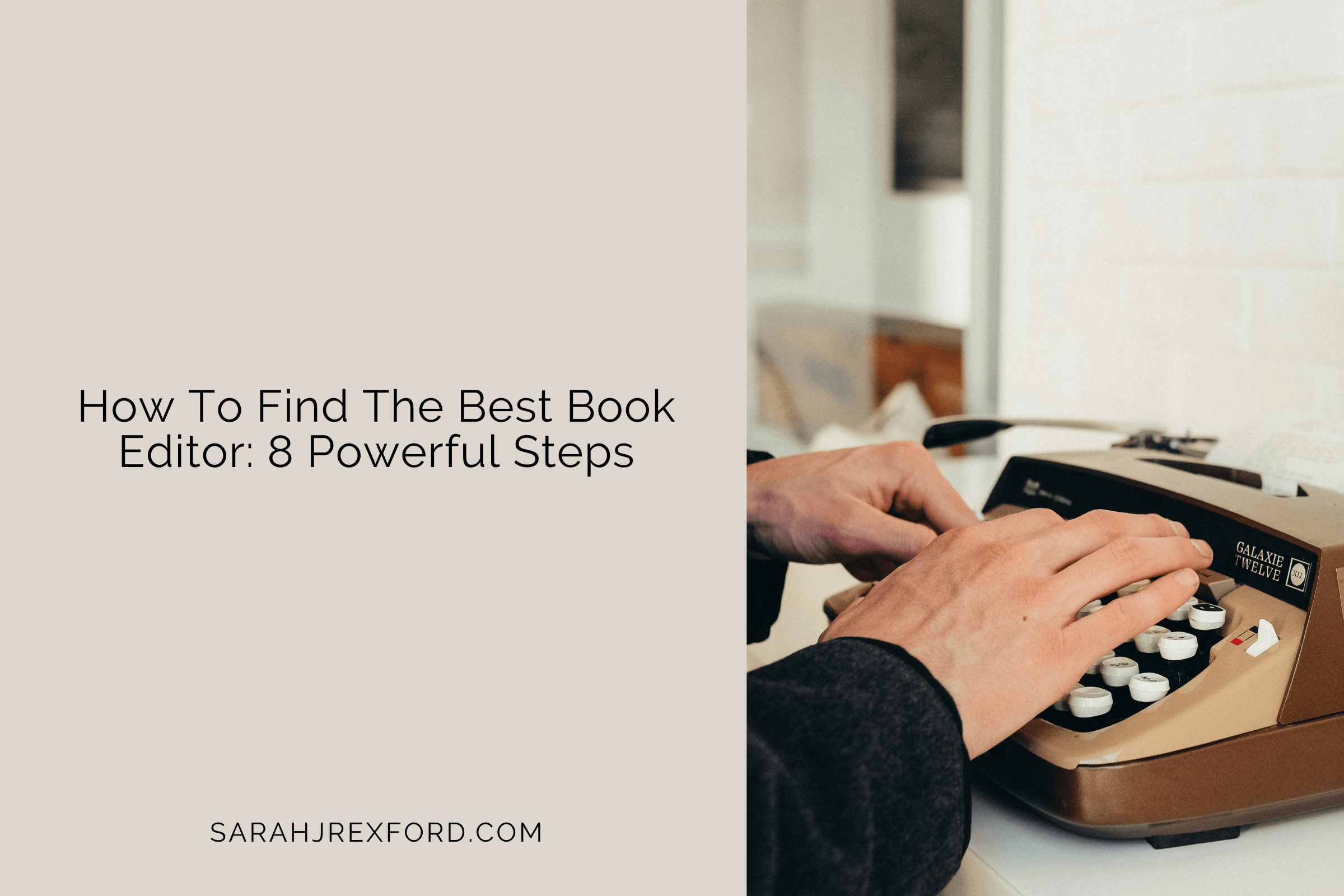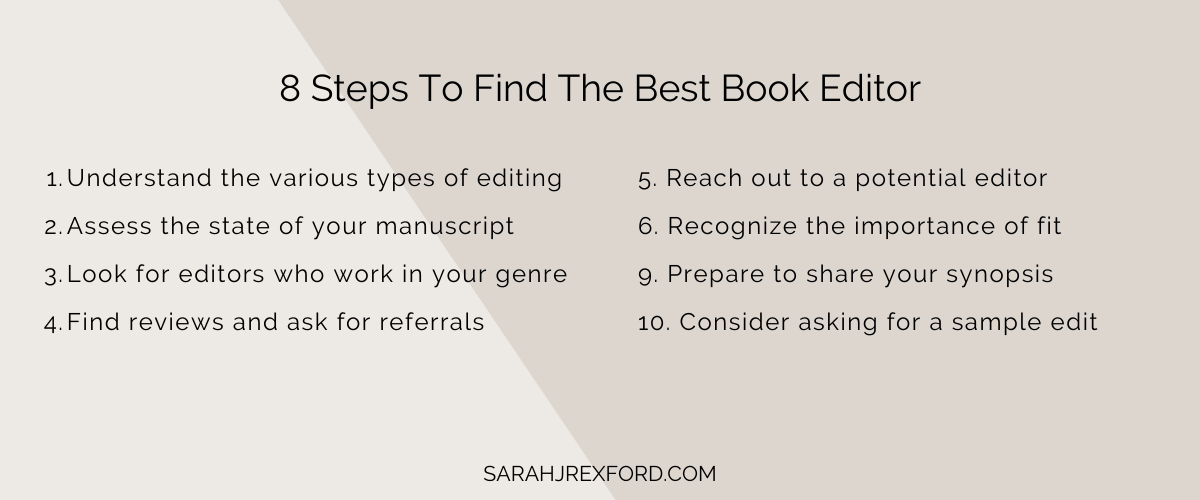How To Find The Best Book Editor: 8 Powerful Steps
Discovering how to find the best book editor is one of the most crucial steps you take as an author. If you traditionally publish, you may want to take your manuscript through a developmental edit prior to pitching your work. If you self-publish, you are solely responsible for how your manuscript goes to press. This means a trained eye is essential for your book’s success.
Regardless of how you choose to publish, your creative writing work is often referred to as your baby. In part due to this, and in part due to working with the material so closely, fresh eyes are essential. They can spot issues the creative’s eyes cannot. So, how to find the right editor for your book? In this article, I answer this pressing question.
How to find the best book editor: what’s covered
How do I find a reputable book editor?
A simple Internet search will provide you with a plethora of editors, but the right one for your project comes down to two aspects: the current status of your manuscript and what you envision as the final status of your manuscript. While there are many strategies for how to find the best book editor, these eight steps will help get you started.
1. Understand the various types of editing
If you’re new to writing you may not realize there are various types of editing. While some edits go by various names, below are five standard types of editing that editors provide.
Developmental edit
A developmental edit is ideal for writers who need help ideating their plot, characters, and talking through their work with a trained professional. This type of edit focuses more on providing feedback for the author, who can then make their own in-line changes.
Content edit
A content edit is typically the first edit where an editor makes in-line changes to your work. Below are a few questions a content editor may ask:
Is your writing tone best for your audience?
Does your choice of verbiage fit with your plot (fiction) or message (nonfiction)?
Are there particular areas you should cut out or expand on?
Content edits follow a developmental edit.
Line Edit
While a content edit is a bit more macro level, a line editor dives into each line of your work in progress. Content editors look to enhance the:
Unique style of your writing
Flow from sentence to sentence
Overall readability of your text
Line editors provide crucial changes that dramatically enhance the readability of your manuscript.
Copy Edit
A copy edit takes an even more micro look at your work. At this stage, the editor will likely make formatting changes to ensure the layout of your manuscript is up to industry standard and ready to go to press.
Copy editors understand that a double space, such as the one I just created between the words double and space, can create odd formatting issues. Additionally, formatting gives your manuscript a polished, professional look, as it should.
Proofread
Proofreads are the final edit a manuscript goes through and the last chance to make changes on the current edition. Forgoing a proofread may feel like an efficient choice, but a proofreader’s task is to catch errors everyone else missed.
2. Honestly assess the state of your manuscript
There are countless writing tips out there, but perhaps the most important is to accurately look at your work. How to find a good book editor, in part, means understanding where your weaknesses lie.
For my first manuscript (may it rest in peace), I hired a professional editor to take it through a fiction manuscript critique. This editor was thorough yet was also tactful. Because I wrote my first manuscript before ever learning how to write creatively, I don’t plan to publish it (and my manuscript critique showed its many weaknesses!).
However, after many years of training I entered into a mentorship with a bestselling author. She provided developmental edits for my manuscript. This gave me insight on its strengths and weaknesses while allowing me to be the one to implement any changes.
Understanding the status of your manuscript will save you time and financial resources as you look for the best editor for your book. I find it’s also helpful to send a writing sample to a potential editor and ask what type of edit they believe you need.
3. Look for editors who work in your genre
Once you have a general idea of the status of your manuscript, it’s time to start looking for the best editor for your book. If you write young adult novels, you don’t necessarily need to find an editor who knows how to write a YA book, but certainly they need to know how to edit one.
Determining how to find an editor for a novel often requires an online search. You may have a list of favorite nonfiction or fiction works and hope to work with a particular editor. What about if you wonder where to find the editor of a book you love, or how to find the editor of a book whose writing style is similar to your own?
Authors often thank their editors in the acknowledgments in the back of their books. This is a great place to look. The Reedsy platform hosts a tremendous list of editors in a plethora of genres. If you attend writing conferences, in person or virtually, ask agents and editors for names of editors who work in your genre.
4. Find reviews and ask for referrals
Have you wondered, “But how to find a good editor for my book, specifically?” Referrals are a great starting place. Reach out to an author you respect and inquire after their editor. In the past, I did this and had the pleasure of working with a fantastic editor.
Many established editors also may have a list of testimonials from previous clients. Feel free to reach out to authors who worked with an editor you are interested in hiring. They will likely be more than happy to share their experience with you.
5. Reach out to a potential editor
Now it’s time to make the cold call! There are different ways to contact editors. Personally, I prefer writers to use an editing form so I can quickly see everything I need to and save them time with back and forth emails.
When you decide to reach out, understand that they know you are doing your best to determine how to find the best book editor for your work.
I recommend including the following in your initial email:
Genre
Word count
Type of edit you desire
Turnaround time
Many editors have wait lists. It helps editors to know when you need your edit finished so they can determine if they can help you.
6. Recognize the importance of fit
Finding the best editor for your project relies heavily on knowing how to be a good book editor yourself.
The more you can teach yourself to self-edit your work, the better you will take an editor’s suggestions.
However, not all suggestions are best. Editing can be extremely subjective. Because of its subjectivity, it’s crucial to find an editor you connect with.
For instance, if you tend to write beautiful prose but hire an editor who employs a cut and dry editing style, chances are you will disagree on many of the edits. A good way to determine if an editor will be a good fit is found in step eight.
7. Prepare to share your synopsis
Reading a synopsis equips editors to do their best work. This is particularly true for a developmental edit. While you may feel hesitant to send the details of your plot and characters to an editor you’ve never met, if they are a professional editor, your synopsis will greatly benefit them.
Writers often worry about sharing their work for fear of their ideas being stolen. However, most creatives are dedicated to working their own ideas into manuscripts, not stealing others’.
I find it extremely helpful to read a synopsis before I dive into editing. This ensures I have an overview of the manuscript before I go in to make changes.
8. Consider asking for a sample edit
Once you find an editor, have done your research, and want to work with them, you may want to request a sample edit. A sample edit (usually one to three pages, double-spaced) allows you to see the editing style of your potential editor. Oftentimes, this simply locks in the working relationship between author and editor.
In the rare chance that it does not, it’s still a win-win:
The editor recognizes the author would not be satisfied with their edits
The author realizes they may need to reconsider the vision they have for their manuscript
Note for writers pursuing traditional publication: your publisher will choose an editor for you to work with, but it’s vital that you share the same vision for your book.
How do you know if an editor is good?
If you understand the benefits of constructive criticism, you’ll know you found a good editor when they provide feedback on your work. An editor’s job is to take your book to the next level. By default, this means they must spot one or more of the following:
Areas of inconsistency
Did you mention something out of order? Do characters contradict themselves? For nonfiction, does the theme flow as it should?
Sentences that need reworked
Does each sentence flow naturally into the next, creating a cohesive whole?
Typos and formatting issues
A great editor understands how to take your manuscript from its current status to ready for publication, without ever losing your unique author voice.
What is the average cost to edit a book?
Price points largely vary from book to book due to topic, length, and turnaround time. However, what is the best estimate for a book? An edit can cost anywhere from $1000 to $10,000. Keep in mind that often, what you pay for is the quality you receive. I dive into this more in my article, How Much Does It Cost To Hire A Book Editor?
How to find the best book editor: your next step
No matter what stage of the writing process you find yourself, reaching out to an editor can drastically improve your work. Whether you are just starting out or nearing the end of your self-editing stage, a professional edit takes your book to the level it needs to be to enter the marketplace.
Below are a few ways I benefited from an editor’s trained eye:
Manuscript critiques point out areas for improvement as well as areas of strength you should dive into at a deeper level
Developmental edits give you the tools to take your manuscript through a makeover, all while keeping your unique tone
One-on-one coaching allows you to watch your editor edit in real time, equipping you to make further edits yourself
Learn to develop mental toughness so your editorial investment pays off! The better you are at considering feedback, the stronger your manuscript can become.
To help you start your author journey, download my free eBook, Become An Author: Your Streamlined Process To Pursue Your Dreams!





